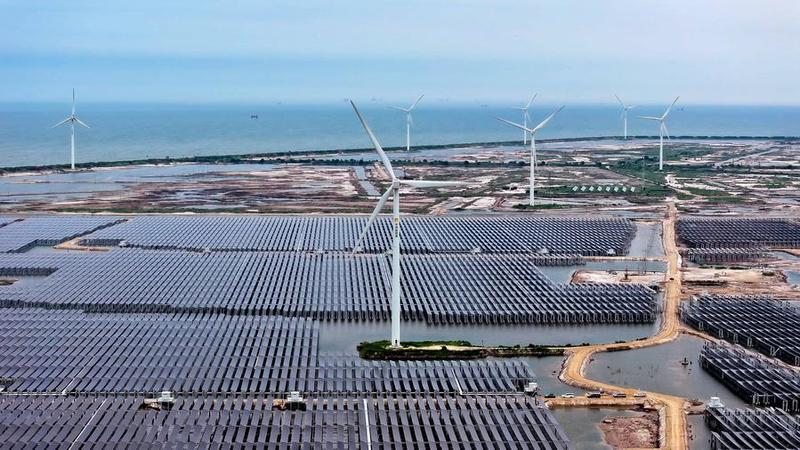
A drone photo taken on Aug 8, 2025 shows a demonstration project for integrated photovoltaic and energy storage in Dongying city, East China's Shandong province. [Photo/Xinhua]
China's commitment to further reducing emissions and boosting renewable energy production is expected to encourage Southeast Asian economies to accelerate their low-carbon transition, analysts said.
The move toward decarbonization is also expected to raise investment in renewable energy among members of the Association of Southeast Asian Nations, as China is one of ASEAN's biggest investors and trading partners in clean technology.
"China is setting the stage for ASEAN countries to increase their confidence in green, low-carbon transition while making economic growth a priority," said Dinita Setyawati, a senior analyst at global energy policy think tank Ember.
Cesar Carlito Baclagon, regional finance campaigner at 350.org, an international environmental group, said that China's plan to cut emissions and increase renewable energy production is significant for ASEAN, because this means Chinese factories will keep producing affordable solar panels, wind turbines and batteries that have long powered the renewable energy sector in ASEAN states.
"China's pledge could spur more renewable investment in ASEAN by sustaining low-cost technology and signaling investors that the age of coal is fading," he added.
In a video speech delivered to the UN Climate Summit held in New York on Sept 24, President Xi Jinping noted that this year marks the 10th anniversary of the Paris Agreement, a pivotal year for countries to submit their new Nationally Determined Contributions, and announced China's new NDCs.
Xi said that China will, by 2035, reduce economy-wide net greenhouse gas emissions by 7 percent to 10 percent from peak levels, striving to do better. It will within the same period increase the share of nonfossil fuels in total energy consumption to over 30 percent and expand the installed capacity of wind and solar power to over six times the 2020 levels, striving to bring the total to 3,600 gigawatts, he said.
China will, by 2035, also scale up the total forest stock volume to over 24 billion cubic meters, make new energy vehicles the mainstream in the sales of new vehicles, expand the National Carbon Emissions Trading Market to cover major high-emission sectors, and establish a climate adaptive society, he added.
Xi's announcement carries significant weight ahead of the 2025 UN Climate Change Conference, or COP30, which is scheduled in Belem, Brazil, from Nov 10 to 21. Signatories to the Paris climate pact, which includes China and ASEAN members, will submit their respective NDCs at COP30.
Setyawati, the senior analyst, said that while China's NDCs cover domestic commitments, these will also have implications for ASEAN members. By investing heavily in renewables, China is treading a new growth path — one that is powered by clean energy and one that ASEAN governments should take note of as soon as possible, she said.
Setyawati also cited China's focus on solar and wind power as homegrown energy sources, indicating that the country is moving toward "a more secure and resilient energy system". She said this will possibly encourage China to invest more in ASEAN states on the back of a possible exponential growth in clean technology.
According to a report released by global think tank Zero Carbon Analytics, China has invested over $2.7 billion in clean energy in ASEAN states between 2013 and 2023. It also led in clean energy trade with ASEAN, valued at $4.3 billion due to strong exports of electric vehicles, batteries, solar modules and wind components.
Baclagon, the finance campaigner, said that what China does beyond its borders is important because its energy investment and infrastructure financing in Asia are the real tests of its climate commitments.
Sharon Seah, a senior fellow at Singapore-based think tank ISEAS-Yusof Ishak Institute, said that ASEAN is "fully committed" to decarbonization as shown by the investment in an ASEAN Common Carbon Framework.
Malaysia, which is this year's rotating chair of ASEAN, has also given the ASEAN Power Grid — a key physical interconnectivity project — new momentum by pushing for greater coordination between energy, economy and finance ministries and central banks to ensure there is a financing mechanism to realize many of the planned projects, Seah said.
编辑:张娟